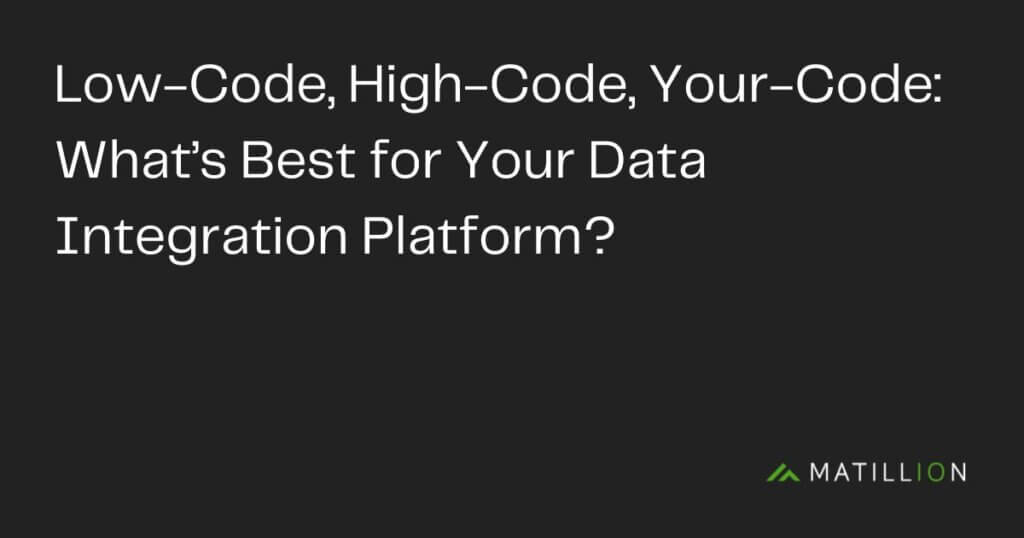- Blog
- 09.22.2022
Low-Code, High-Code, Your-Code: What’s Best for Your Data Integration Platform?
 The last several years have seen the data landscape transform at pace. While organizations on the whole are becoming better at transforming and moving data, and more dedicated to deriving insights from it, the volume of data they produce is growing exponentially. The result is a constant game of catchup, where data becomes more important and more accessible while simultaneously becoming harder to manage due to its volume, lack of structure, and dynamic nature.
The last several years have seen the data landscape transform at pace. While organizations on the whole are becoming better at transforming and moving data, and more dedicated to deriving insights from it, the volume of data they produce is growing exponentially. The result is a constant game of catchup, where data becomes more important and more accessible while simultaneously becoming harder to manage due to its volume, lack of structure, and dynamic nature.
In this environment, data preparation and integration is essential to sharing insights at the speed the business needs them. However, this process isn’t simple, and in most organizations only a select group of talented data engineers have the capabilities to execute this work.
Herein lies the problem. When you consider that BI developers, DBAs, and business analysts can all benefit from access to this data, it’s clear that this restriction is a shortcoming. Ideally, people in each of these roles would be able to create value from data quickly and seamlessly, without the need for in-depth coding knowledge. And that’s where Low-Code comes in.
Cracking the code
Low-Code has ushered in a new era of productivity for data professionals and business leaders alike, allowing them to use drag and drop components to build data pipelines and applications quickly and effectively. We’ve written previously about some of the advantages Low-Code presents to organizations wrestling with large amounts of data and multiple stakeholders, from optimized integration to enhanced automation. But, is Low-Code really the silver bullet solution data professionals have been crying out for? The short answer is no. At least, not on its own. 
Cracking the data integration code
To really get the most value from data, it’s important to look at the development options available and the different qualities they possess. In this instance, Low-Code, High-Code, and Your-Code.
Low-Code is a great resource when it comes to quickly developing applications and data pipelines and ensuring productivity across your teams. For generic use cases it can save valuable time, freeing your data professionals to focus on more demanding tasks and providing insights to the business more quickly. But there will always be some data problems that are hard or even impossible to solve with such limited solutions. Not to mention some data professionals who want to flex their coding muscles and make their mark on the data integration workflows in your business. After all, that’s why you hired them.
At Matillion, we think the secret to good data work is removing restrictions. That’s why we’re dedicated to pleasing both of these camps, providing a tool that’s really accessible to people who want to be productive with Low-Code, but doesn’t exclude those who want to use tools like Python, Spark, or dbt to create more bespoke solutions.
Or, similarly, those who want to use and share code that has been built previously – Your-Code – to get the most from data in a way that’s specific to their organization. Your-Code, the existing assets you worked on and want to document for other team members, can act as a set of building blocks to kickstart new projects and future data workflows. All with the built-in governance, security, and visibility you need to succeed.
Practically, this freedom of choice is the only way to extract the optimum value from both your people and your data – allowing for fast working and optimum productivity, as well and the bespoke activities that enable you to put data to work in exactly the way you want.
Want to learn more?
Want to know more about this topic? You’ll be pleased to know that striking the right balance between different coding options to be more productive with data will be one of the key topics at this year’s Matillion Data Unlocked. To learn more about the tools and techniques that can help you unlock the potential of cloud data and improve the productivity of your data team, you can register for the event here.
Andreu Pintado
Featured Resources
Custom Connector for Public Statistics (Police API)
A demonstration of the practical steps for setting up components, manipulating and validating data, creating and scheduling ...
BlogMastering Git At Matillion. An In-Depth Guide To Merging
Merging in Git is the process of integrating changes from one branch into another. Merging is the backbone of collaboration in ...
BlogWhat is an API?
What is an API? An API is an application programming interface that is a way for two or more computer programs or components ...
Share: